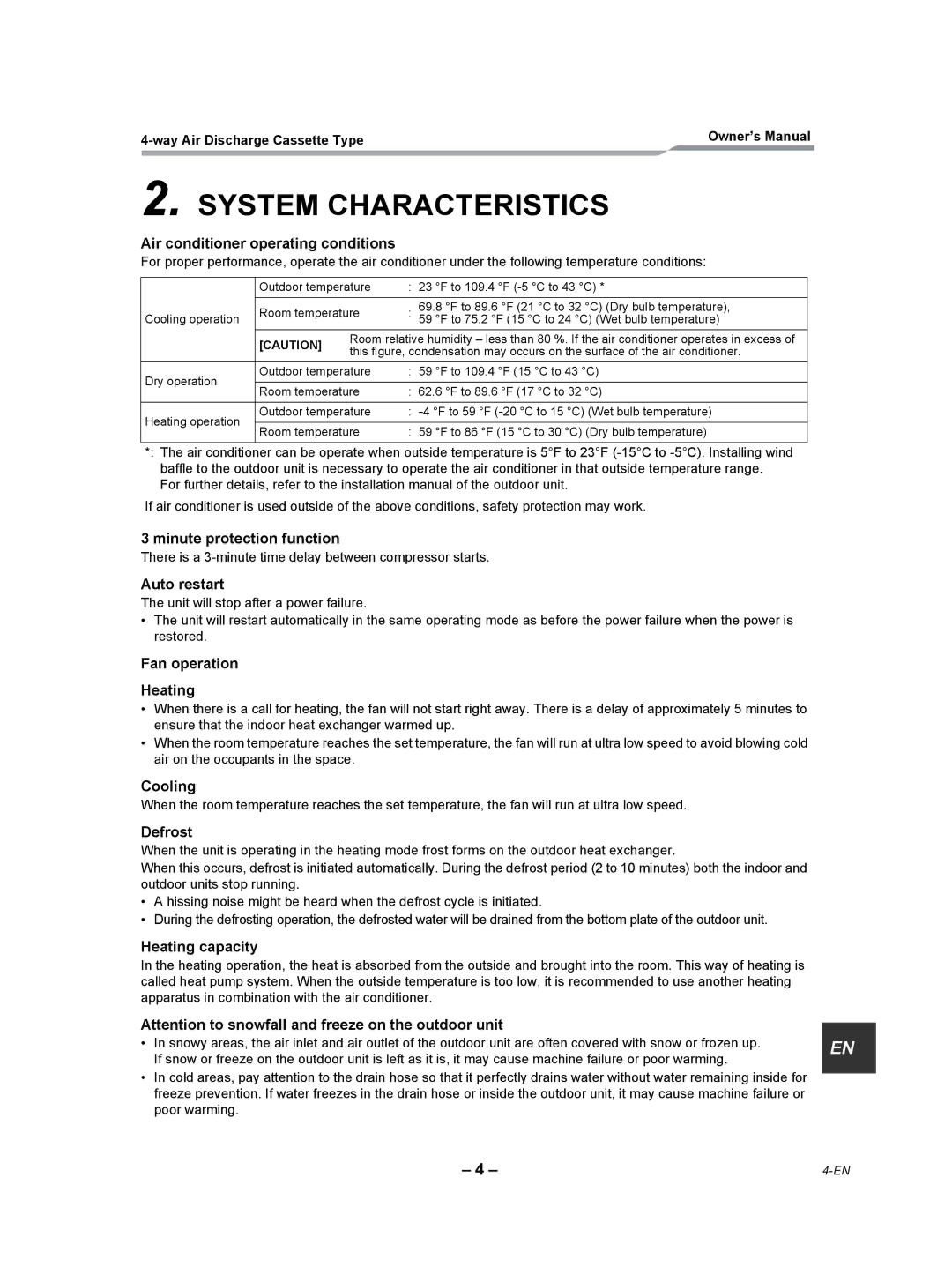
| Owner’s Manual |
2. SYSTEM CHARACTERISTICS
Air conditioner operating conditions
For proper performance, operate the air conditioner under the following temperature conditions:
| Outdoor temperature | : | 23 °F to 109.4 °F | ||
|
|
|
|
| |
Cooling operation | Room temperature | : | 69.8 °F to 89.6 °F (21 °C to 32 °C) (Dry bulb temperature), | ||
59 °F to 75.2 °F (15 °C to 24 °C) (Wet bulb temperature) | |||||
| [CAUTION] | Room relative humidity – less than 80 %. If the air conditioner operates in excess of | |||
| this figure, condensation may occurs on the surface of the air conditioner. | ||||
|
| ||||
Dry operation | Outdoor temperature | : | 59 °F to 109.4 °F (15 °C to 43 °C) | ||
|
|
|
| ||
Room temperature | : | 62.6 °F to 89.6 °F (17 °C to 32 °C) | |||
| |||||
|
|
| |||
Heating operation | Outdoor temperature | : | |||
Room temperature | : | 59 °F to 86 °F (15 °C to 30 °C) (Dry bulb temperature) | |||
| |||||
|
|
|
|
| |
*: The air conditioner can be operate when outside temperature is 5°F to 23°F
For further details, refer to the installation manual of the outdoor unit.
If air conditioner is used outside of the above conditions, safety protection may work.
3 minute protection function
There is a
Auto restart
The unit will stop after a power failure.
•The unit will restart automatically in the same operating mode as before the power failure when the power is restored.
Fan operation
Heating
•When there is a call for heating, the fan will not start right away. There is a delay of approximately 5 minutes to ensure that the indoor heat exchanger warmed up.
•When the room temperature reaches the set temperature, the fan will run at ultra low speed to avoid blowing cold air on the occupants in the space.
Cooling
When the room temperature reaches the set temperature, the fan will run at ultra low speed.
Defrost
When the unit is operating in the heating mode frost forms on the outdoor heat exchanger.
When this occurs, defrost is initiated automatically. During the defrost period (2 to 10 minutes) both the indoor and outdoor units stop running.
•A hissing noise might be heard when the defrost cycle is initiated.
•During the defrosting operation, the defrosted water will be drained from the bottom plate of the outdoor unit.
Heating capacity
In the heating operation, the heat is absorbed from the outside and brought into the room. This way of heating is called heat pump system. When the outside temperature is too low, it is recommended to use another heating apparatus in combination with the air conditioner.
Attention to snowfall and freeze on the outdoor unit
•In snowy areas, the air inlet and air outlet of the outdoor unit are often covered with snow or frozen up. If snow or freeze on the outdoor unit is left as it is, it may cause machine failure or poor warming.
•In cold areas, pay attention to the drain hose so that it perfectly drains water without water remaining inside for freeze prevention. If water freezes in the drain hose or inside the outdoor unit, it may cause machine failure or poor warming.
EN |
– 4 – |
